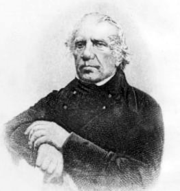
Samuel Bamford
Encyclopedia

England
England is a country that is part of the United Kingdom. It shares land borders with Scotland to the north and Wales to the west; the Irish Sea is to the north west, the Celtic Sea to the south west, with the North Sea to the east and the English Channel to the south separating it from continental...
radical
Radicalism (historical)
The term Radical was used during the late 18th century for proponents of the Radical Movement. It later became a general pejorative term for those favoring or seeking political reforms which include dramatic changes to the social order...
and writer, who was born in Middleton
Middleton, Greater Manchester
Middleton is a town within the Metropolitan Borough of Rochdale, in Greater Manchester, England. It stands on the River Irk, south-southwest of Rochdale, and north-northeast of the city of Manchester...
, Lancashire
Lancashire
Lancashire is a non-metropolitan county of historic origin in the North West of England. It takes its name from the city of Lancaster, and is sometimes known as the County of Lancaster. Although Lancaster is still considered to be the county town, Lancashire County Council is based in Preston...
.
Biography
Bamford was one of five children born to Daniel Bamford, a muslin weaver, part-time teacher, and later master of the Salford workhouse, and his wife, Hannah. After his father withdrew him from Manchester Grammar SchoolManchester Grammar School
The Manchester Grammar School is the largest independent day school for boys in the UK . It is based in Manchester, England...
Bamford became a weaver, and then a warehouseman in Manchester
Manchester
Manchester is a city and metropolitan borough in Greater Manchester, England. According to the Office for National Statistics, the 2010 mid-year population estimate for Manchester was 498,800. Manchester lies within one of the UK's largest metropolitan areas, the metropolitan county of Greater...
. In 1817 he was imprisoned in the New Bailey Prison in Salford on suspicion of high treason (this was on account of his political activities). From there he was taken to London and examined before the Privy Council presided over by Lord Sidmouth. After promising to be of future good behaviour he was released and was then able to return to live in his cottage at Middleton with his wife Jemima.
In August 1819, Bamford led a group from Middleton to St Peter's Fields, to attend a meeting pressing for parliamentary reform and the repeal of the Corn Laws
Corn Laws
The Corn Laws were trade barriers designed to protect cereal producers in the United Kingdom of Great Britain and Ireland against competition from less expensive foreign imports between 1815 and 1846. The barriers were introduced by the Importation Act 1815 and repealed by the Importation Act 1846...
, where they witnessed the Peterloo Massacre
Peterloo Massacre
The Peterloo Massacre occurred at St Peter's Field, Manchester, England, on 16 August 1819, when cavalry charged into a crowd of 60,000–80,000 that had gathered to demand the reform of parliamentary representation....
. Bamford was arrested and charged with treason. Although the evidence showed that neither he nor any of his group had been involved in the violence, he was nevertheless found guilty of inciting a riot and sentenced to a year in Lincoln gaol
Lincoln (HM Prison)
HM Prison Lincoln is a Category B men's prison, located in Lincoln, Lincolnshire, England. The prison is operated by Her Majesty's Prison Service.-History:...
. The experience of the massacre made a deep impression on Bamford, and convinced him that the state's power would always succeed against radical militancy. He came to be seen as a voice for radical reform, but opposed to any activism that involved physical force.
Bamford was the author of poetry (mostly in standard English) but of those in dialect several showing sympathy with the conditions of the working class became widely popular, and his Passages in the Life of a Radical (1840 – 1844) is an authoritative history of the condition of the working classes in the years after the Battle of Waterloo
Battle of Waterloo
The Battle of Waterloo was fought on Sunday 18 June 1815 near Waterloo in present-day Belgium, then part of the United Kingdom of the Netherlands...
. He also compiled The Dialect of South Lancashire (Manchester: John Heywood, 1850). He died at Harpurhey
Harpurhey
-Landmarks:Harpurhey Edwardian Swimming Baths, situated on Rochdale Road was built between 1909-10 by Henry Price, Manchester's first City Architect. Listed grade II in, the baths were closed to the public in 2001 after serious defects were discovered and the entrance building is currently being...
on 13 April 1872 and was given a public funeral, attended by thousands. A memorial obelisk was unveiled in Middleton Cemetery in 1877. Part of the inscription reads: "Bamford was a reformer when to be so was unsafe, and he suffered his faith."
External links
- Bamford's "Passages in the Life of a Radical" and "Early Days" in two volumes edited with an introduction by Henry Dunckley ("verax") London: T. Fisher Unwin, Paternoster Square: MDXCCCXCIII
- Biography & selected writings at gerald-massey.org.uk
- Biography at thisismiddleton.co.uk
- Publications by & about Bamford at the Internet ArchiveInternet ArchiveThe Internet Archive is a non-profit digital library with the stated mission of "universal access to all knowledge". It offers permanent storage and access to collections of digitized materials, including websites, music, moving images, and nearly 3 million public domain books. The Internet Archive...

